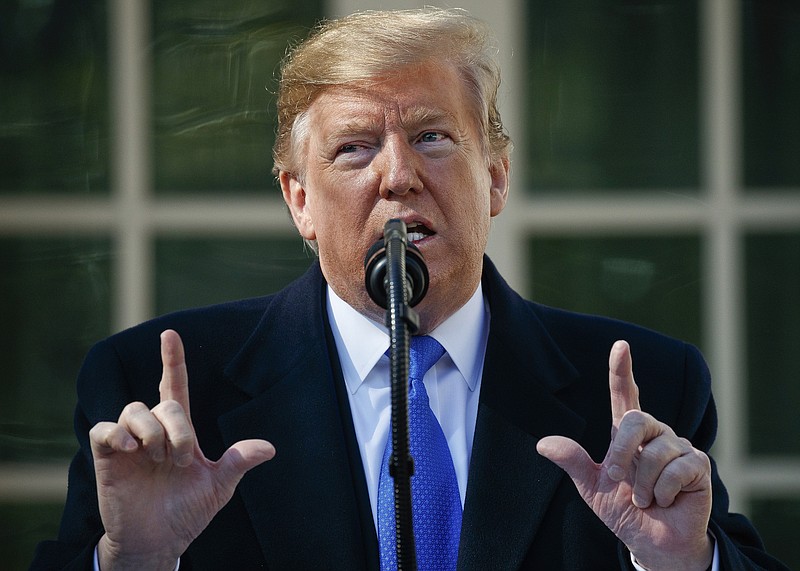It's a pattern: Donald Trump says he's done nothing wrong, but for more than two years now, he and the people who work or worked for him have lied, connived, threatened and paid off people who might say otherwise.
For a man who's done nothing wrong, Trump surely is worried about people finding something that shows he did.
Lawyers and pundits have even coined a name for Trump's obsession: They call it "obstructing justice in plain sight."
The New York Times last week chronicled some of that reported obstruction in a news analysis headlined, "Intimidation, pressure and humiliation: Inside Trump's two-year war on the investigations encircling him.
They point to the firing of Jim Comey when the former FBI director wouldn't let go of the Michael Flynn investigation. The threat to fire Comey's replacement, Rod Rosenstein. The forced resignation of Attorney General Jeff Sessions for recusing himself in the Russia probe and being unable to "control" the widening Russia investigation. The Sessions' replacement - temporarily - with Matt Whitaker, who told people his job was to "jump on a grenade" for the president.
Don't forget that in the summer of 2017, Trump ordered the firing of the Russia probe special counsel Robert Mueller, but White House counsel, Don McGahn, refused and threatened to quit if Trump persisted. The president backed down. Also that summer, one of Trump's lawyers reached out to the lawyers for two former Trump aides charged in connection with the Russia probe - Paul Manafort and Flynn - to discuss possible pardons. It appeared that the president was dangling pardons to influence their decisions about whether to plead guilty and cooperate in the Mueller investigation.
Then Trump worked with Republican congressional allies to flip the script and begin investigating the investigators. Remember Rep. Devin Nunes' late-night visit to the White House grounds and claim that he had reviewed evidence of troubling activity by the U.S. intelligence community? In April of 2018, Trump hired Rudy Giuliani as his personal lawyer and TV attack dog. The aim was to discredit Mueller and the Justice Department and paint them as "a cabal inside the FBI and Justice Department to take down Mr. Trump."
The latest revelation is another allegation of possible would-be obstruction - that the president may have tried to interfere with the federal investigation of his former lawyer and fixer Michael Cohen through grenade-jumper Whitaker.
According to the Times story, sourced by "several American officials with direct knowledge of the call," Trump late last year called Whitaker and pressured him to put Trump ally and U.S. attorney Geoffrey Berman in charge of the widening investigation of the president's role in silencing women with hush payments during the 2016 campaign. Whitaker knew he could not put Berman in charge because Berman already had recused himself from the investigation.
The Times wrote: "The president soon soured on Mr. Whitaker, as he often does with his aides, and complained about his inability to pull levers at the Justice Department that could make the president's many legal problems go away. Trying to install a perceived loyalist atop a widening inquiry is a familiar tactic for Mr. Trump, who has been struggling to beat back the investigations that have consumed his presidency. His efforts have exposed him to accusations of obstruction of justice as Robert S. Mueller III, the special counsel, finishes his work investigating Russian interference in the 2016 election."
Cohen's hush money case, over which he pleaded guilty to charges of campaign finance because the money - paid specifically to keep the stories of the president's affairs with a porn star and a Playboy model secret right before the 2016 election - was not reported. Cohen also pleaded guilty to lying to Congress about when Trump negotiations ended during the campaign (they really didn't) on building a Trump Tower in Moscow. Cohen's cases came to light as part of the Mueller probe, as did a third inquiry examining the flow of money to the Trump inaugural committee.
Earlier this month, Whitaker told a congressional committee that the president had never pressured him over that or other Trump-related investigations. Now his testimony to the committee is under scrutiny by House Democrats for possible perjury. Trump called the report "more fake news."
But this is a president who has publicly attacked his own government law enforcement even more than he has attacked the media. The Times calls it "a campaign to create a narrative of a president hounded by his 'deep state' foes."
Most presidents rail against rogue foreign countries. Trump, in two years, has publicly attacked the Russia investigation more than 1,100 times, according to a Times analysis of his speeches and Twitter posts.
Julie O'Sullivan, a criminal law professor at Georgetown University, told the Times she believes there was ample public evidence that Trump had the "corrupt intent" to try to derail the Mueller investigation, the legal standard for an obstruction of justice case.
Five of Trump's staff members have already been convicted - CONVICTED - of illegal activities directly relevant to the investigation, including working with Russia during the campaign. Another has been indicted, along with more than two dozen Russians, a Dutch lawyer and a California man.
If the president is innocent, why did he - and they - repeatedly lie, cover up, even threaten?
